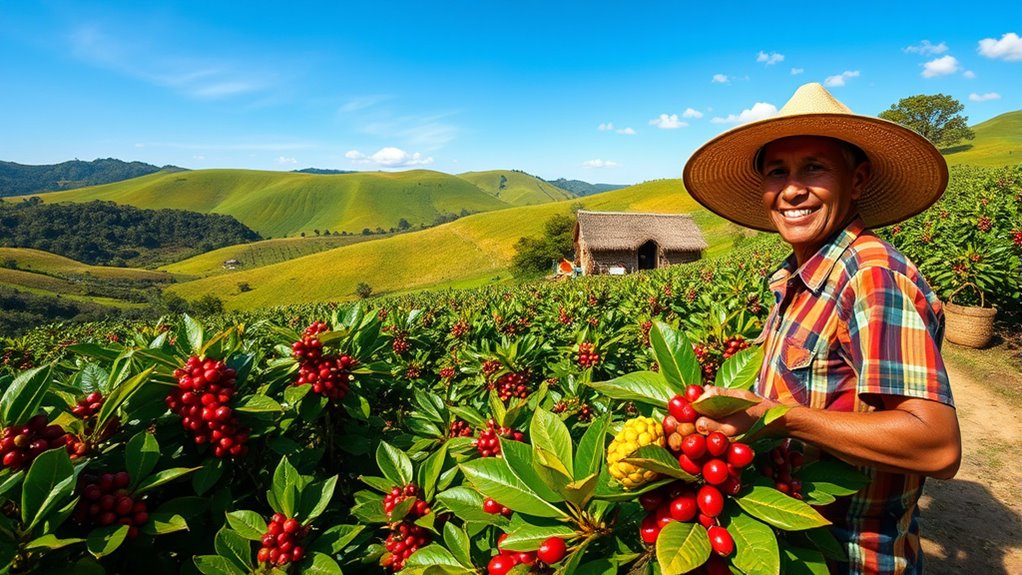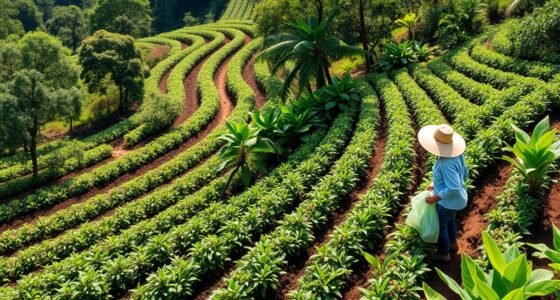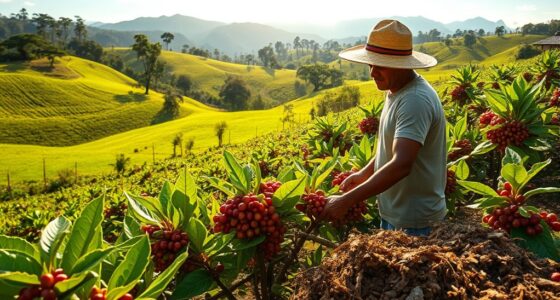A living income for coffee farmers means they earn enough to cover basic needs like food, healthcare, and education, regardless of market ups and downs. Many farmers face challenges in reaching this goal due to unfair prices and market fluctuations. Fair trade practices and sustainable farming methods help improve their income and resilience. Supporting these efforts creates more equitable and long-lasting solutions. Keep exploring to discover how these approaches make a real difference for farmers’ lives.
Key Takeaways
- A living income covers basic needs like food, healthcare, and education, ensuring farmers can meet their families’ essentials.
- Fair trade practices and certification help guarantee fair prices, supporting farmers in achieving a living income.
- Sustainable farming methods reduce costs and improve yields, contributing to higher income stability for coffee farmers.
- Market fluctuations and low prices often prevent farmers from earning a living income without ethical trading systems.
- Supporting holistic approaches, including fair trade and sustainability, promotes long-term economic stability for coffee farming communities.

Many coffee farmers struggle to earn a living income, despite their hard work growing one of the world’s most popular beverages. The reality is that the current coffee market often doesn’t provide farmers with enough to cover basic needs like food, healthcare, and education. This makes it clear that the system isn’t working fairly for those who dedicate their lives to producing coffee. To address this, many organizations promote fair trade practices, which aim to guarantee farmers receive a fair price for their beans. Fair trade certification helps assure that farmers aren’t exploited by unfair prices and unfair trading practices. It’s a step toward creating a more equitable system where farmers can earn enough to support themselves and their families. But fair trade isn’t just about higher prices; it also encourages sustainable farming methods, which are essential for long-term income stability. Sustainable farming involves practices that protect the environment, conserve resources, and maintain soil health, so farmers can continue to grow coffee without depleting their land. These methods reduce reliance on chemical inputs and promote biodiversity, making farms more resilient to climate change and market fluctuations. When farmers adopt sustainable farming, they often see better yields and higher-quality coffee, which can command better prices in the market. This creates a cycle where fair trade and sustainable farming work hand in hand to improve farmers’ livelihoods. Additionally, sustainable practices can lead to cost savings in the long run, as farmers reduce their dependence on costly inputs and improve efficiency. However, shifting to sustainable farming can be challenging without proper support, training, and access to resources. That’s why fair trade organizations often provide education and technical assistance to help farmers adopt environmentally friendly techniques. This support not only improves their immediate income but also builds resilience against future challenges. One way to support sustainable farming is through the adoption of electric tools and equipment, which can reduce labor costs and environmental impact. Ultimately, assuring coffee farmers earn a living income involves more than just paying higher prices; it requires a holistic approach that promotes fair trade principles and encourages sustainable farming practices. When these elements come together, farmers are empowered to break free from poverty cycles and build more stable, prosperous futures. It’s about creating a system that values their hard work, respects the environment, and recognizes the importance of ethical, sustainable practices in coffee production. By supporting fair trade and sustainable farming, you help foster a future where coffee farmers can truly thrive, earning the income they deserve for their crucial work.
Frequently Asked Questions
How Is a Living Income Calculated for Coffee Farmers?
You determine a living income for coffee farmers by using income measurement methods that consider the costs of essential needs like food, housing, and healthcare. Fair trade standards often guide this process, ensuring farmers earn enough to cover basic living expenses. You gather data on farm income, expenses, and local living costs, then calculate the income needed to meet these needs sustainably, supporting fair and equitable income levels.
What Factors Influence Coffee Farmers’ Income Levels?
Did you know that crop diversity can boost a coffee farmer’s income by up to 30%? Factors like Fair Trade certification guarantee better prices and fair wages, directly impacting income levels. Your income depends on market prices, production costs, access to fair trade markets, and sustainable practices like crop diversity. These elements help farmers stabilize earnings, improve quality, and build resilience against price fluctuations.
How Does Climate Change Affect Coffee Farmers’ Livelihoods?
Climate change impacts your coffee farming by causing unpredictable weather patterns, droughts, and pests, which threaten crop yields. To build climate resilience, you can diversify your crops, reducing reliance on coffee alone and spreading risk. This approach helps stabilize your income despite changing climate conditions. By adopting sustainable practices and diversifying, you can better safeguard your livelihood and ensure a more secure future for your farm.
Are There Government Policies Supporting Living Wages for Coffee Farmers?
You’ll find that some governments do support coffee farmers through policies like subsidies and trade agreements, but only about 20% actively promote living wages. These policies aim to boost farmers’ incomes, yet many still struggle to attain a fair living wage. When trade policies favor large exporters, small farmers often get squeezed, emphasizing the need for stronger government action to ensure fair pay and sustainable livelihoods.
How Can Consumers Support Living Income Initiatives in Coffee Farming?
You can support living income initiatives by choosing Fair Trade coffee, which guarantees farmers get fair wages. Additionally, look for brands that promote direct purchase from coffee farmers, cutting out middlemen and increasing farmers’ earnings. By prioritizing these options, you help improve farmers’ livelihoods and promote sustainable practices. Your conscious choices directly contribute to a fairer coffee industry and support farmers in achieving a living income.
Conclusion
To guarantee coffee farmers can thrive, we all need to support fair wages and sustainable practices. A living income isn’t just a wish; it’s a right that benefits everyone—from farmers to consumers. Remember, “You reap what you sow,” so investing in fair livelihoods today secures a better harvest tomorrow. By standing together, we can turn this vision into reality and make a lasting difference in their lives.









